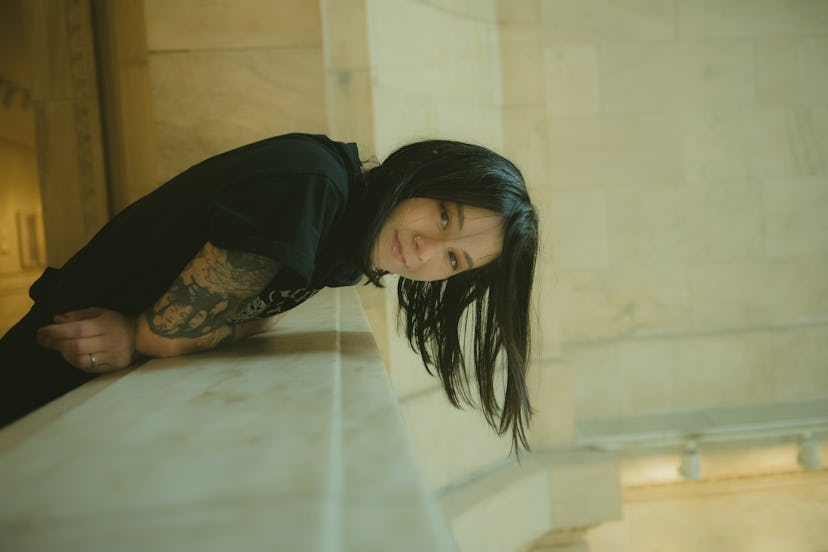Japanese Breakfast’s Michelle Zauner On Writing a New Record and Her First Book At the Same Time

Back in March, on a sweltering day in Austin Texas, Michelle Zauner, the 29-year-old lead singer of Japanese Breakfast, was thinking about change. Backstage before one of her many gigs at [SXSW] (https://www.wmagazine.com/gallery/sxsw-2019-best-celebrity-instagrams), she was reminiscing about the first time she attended the festival, in 2016. “That was kind of the jumpstart of Japanese Breakfast’s career in a lot of ways,” she said. “I had to throw a band together and mix all the tracks… It was kind of the quintessential South By hustle.” But the hustle paid off; after that festival, the band was signed. Now, there’s a little less chaos. “It’s very different,” she noted. “It’s a lot easier.”
In a few weeks, it would be the third anniversary of the band’s 2016 debut album Psychopomp. The following year, in 2017, their sophomore offering, Soft Sounds from Another Planet, was met with overwhelmingly positive reviews, landing on several ‘Best Of’ year-end lists. In addition to putting out two critically acclaimed records in as many years, Zauner has also proven herself to be a cultural juggernaut: directing music videos for both herself and bands like Better Oblivion Community Center and Charly Bliss; scoring the video game Sable, due out this year; and even releasing her own role-playing game, Japanese Breakquest. And, when we met in March, news of her latest project had just broken: a memoir with the same name as her 2018 New Yorker essay “Crying in H Mart.”
The essay, which focuses on Zauner’s grief following the passing of her mother, was published on The New Yorker‘s website in August 2018. It was the site’s top-performing story for several days. “I didn’t realize how big it was going to be,” she said. “It definitely helped me solidify that I was going to get a book deal.” Knopf announced the book in late February, and weeks later, Zauner was starting to grapple with the reality of the task ahead. “I’m struggling to find time,” she said. “I have a few weeks off here and there, but, like, this morning I thought, ‘I’ll wake up and write for a few hours,’ and that didn’t happen. It’s hard not to get down on yourself. I was trying to write a thousand words every day, five days a week, and it’s just not happening.” She was trying to stay as regimented as possible, though, when time allowed. “I have a really freakish method,” she explained. “I use an egg timer and try not to get too caught up in the language of it. It’s really chaotic.”
“With [writing] music, there’s so many different factors that you can change around to help you,” she continued. “If it’s not working on guitar, you can move to piano or bass. With writing, you’re just staring at a computer and a blank paper. You have to reach into a part of you, and there is no skipping steps. It’s a lot easier to get stuck and frustrated.”
The fact that the book focuses on some deeply painful subject matter didn’t make the process any easier. Zauner admitted she was procrastinating the hardest parts. “The book is largely about my mom and illness,” she said. “The beginning chapters are about happy stuff that I was looking forward to writing and dwelling and elaborating on. I’m starting to enter the chapters that get really hard to confront, so I have been putting them off. It’s going to be tough.”
When we caught up over phone almost six months later, Zauner had reached something of a breathing period, having turned in her first draft. “It didn’t feel as good as I imagined it would,” she admitted. “It’s a weird thing because you know how much work you still have to do. You’ve lived in it for a long time, and it’s not your best. It got to the point where I needed to let it go and to gain some more perspective. It feels like post-tour depression, which is a thing a lot of musicians have started talking about. You have this sense of purpose every day and then one day it’s gone and you don’t have anything to really show for it.”
While the book was off with her editor, Zauner was turning her attention to what she called her “other projects”: the soundtrack for a new indie videogame, and Japanese Breakfast’s third album. “A big reason why I felt it was time to write the book is that the last two records were about grief and I want to make a record that’s tackling a new subject, even though grief is something I will live with forever,” she said. “This book feels like a real airing of grievances in a literal way. It felt like I needed this 90,000 word document telling people exactly what happened. How many words are on an album? It can’t be more than a thousand.”
Though Zauner said the record was still in the “very fledging” stages, she imagines that along with a new focus, it will inevitably reflect a new sound. “I’m a more confident musician and better producer and my collaborators have gotten better,” she said. “I hope that it sounds bigger and better.”
And in the meantime, Japanese Breakfast remains very much active, playing a slew of festivals over the next few months, including this weekend’s Lollapalooza. “I actually really enjoy playing festivals,” she said. “I feel like I’m less of an artist for saying that. Our band works well in a festival environment. Headlining shows, it can be difficult to pick the flow of the set. With a festival, you are doing one act. It’s maximalist, all the bops. And I like flirting with a mob. The people who come to your headlining gigs, they know you and it’s like they’re your friends. When you’re playing a festival, it’s kind of like flirting with a bunch of strangers.”